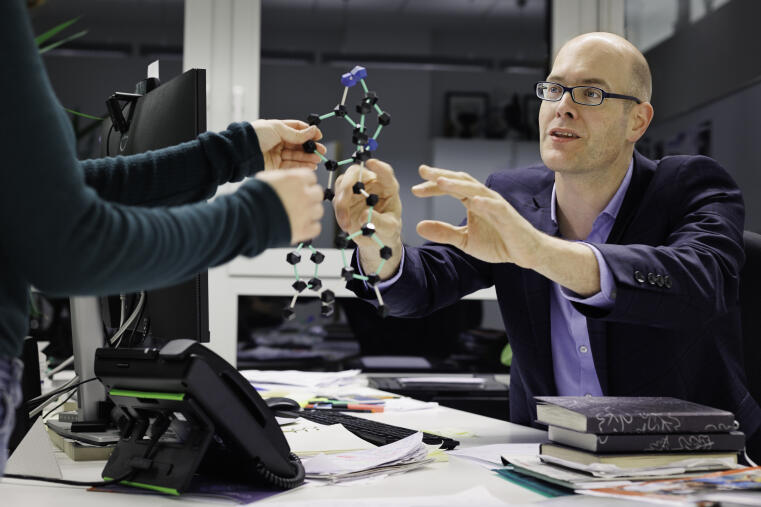Research without limits

There are evidently many young people who would like to be part of the “Glorius Group”. Very many, in fact. Chemistry Professor Frank Glorius receives enquiries almost on a daily basis. As a result, he has to reject requests from numerous applicants all over the world – far more than 1,000 times every year.
The young people who make it into his group are outstandingly good and highly motivated, and they have the complete confidence of their mentor. The only thing he demands of everyone, says the 51-year-old Glorius, is that they all work well together within his team. “Be interested in the other team members’ experiments, swap ideas with one another,” he tells them. 69 students have so far completed their doctoral degrees in the Glorius Group. Adding together all the former and current team members, Frank Glorius arrives at a total of 170 people he has supervised in the past or is still supervising now. The various generations of junior researchers past and present all come together at the Group’s annual summer festival held in Münster.
Frank Glorius, who likes to cycle that extra lap on his way to work in the morning, describes himself as a “hardcore researcher”. He loves science; he often replies to emails at night. The list of his awards is long, and the list of his scientific publications is even longer. The Glorius Group is famous worldwide for its research in current fields of chemistry; in many of its projects, the Group collaborates with partners from other disciplines. Its research focuses include organic photocatalysis, the development of sustainably producible functional molecules, and surface chemistry. A new hobby is the chemistry of data science. “I want us to be world-class in every single one of these fields,” Glorius says. His 2023 ERC Advanced Grant is the third ERC grant he has received, and with this latest funding he wants to develop new methods of energy transfer photocatalysis and produce molecular structures which can be used in the manufacture of medicines, for example.
When Frank Glorius – who is also currently Dean of the Faculty of Chemistry and Pharmacy – is asked about a typical situation in his everyday working life, he describes the following scene: “I sit at my desk. And then someone from my team puts their head around the office door and I call out, ‘Come in’.” Working with other people is something he is particularly fond of – whether it’s a discussion with another professor, for example, or with high-ranking representatives of the chemicals industry.
Frank Glorius got into chemistry in a “classic” way, he says – via a chemistry set as a child. At that time he and his family lived in Walsrode, in the Lüneburg Heath area of northern Germany. After studying chemistry at the Universities of Hanover and Stanford and doing research for his PhD at the Max Planck Institute (MPI) of Coal Research in Mülheim an der Ruhr, he then completed his doctoral thesis at the University of Basel in Switzerland. Further stages in his career were: a post-doctorate at Harvard University in Cambridge (USA), heading a group of junior researchers at the MPI in Mülheim, an appointment as professor at the University of Marburg, and finally the move to Münster in 2007.
Chemistry is also a part of his life at home – for example through his twin daughters, one of whom is studying chemistry, the other biochemistry. His wife is a chemist with a leading position in industrial research, and their son has developed an interest in the subject at school. When he wants to take his mind off chemistry, he likes reading news magazines or having guests at home. But what he likes most is watching television – especially series. “Take for example the programme ‘Die Höhle der Löwen’ (‘Dragons’ Den’), in which young entrepreneurs look for venture capitalists: it’s something the whole family can watch, talk about and in passing learn something about the business world,” he says.
The chemistry experiments which fascinated him as a child are something he still loves – even if he no longer stands in a laboratory today. However: no matter how wonderful the experiments are, he says, it’s always important that researchers never forget the issue of safety in their everyday work. While he was working on his PhD he accidentally triggered an explosion in the lab – and for this reason alone he takes the issue especially seriously. At the time, no one was hurt, fortunately, and today Glorius can laugh and reveal the nickname which his fellow-PhD students gave him: “At the Institute they called me ‘Firecracker’ for a while.”
Christina Hoppenbrock
This article is from the brochure "Twelve months, twelve people", published in February 2024.
Download the entire brochure as a pdf file
To the other articles in the brochure "Twelve months, twelve people".
